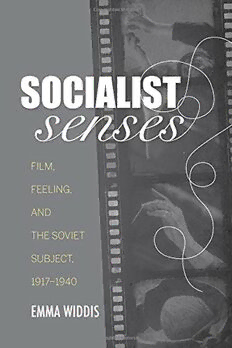
Socialist Senses: Film, Feeling, and the Soviet Subject, 1917–1940 PDF
Preview Socialist Senses: Film, Feeling, and the Soviet Subject, 1917–1940
SOCIALIST senses This page intentionally left blank SOCIALIST senses FILM, FEELING, AND THE SOVIET SUBJECT, 1917–1940 EMMA WIDDIS INDIANA UNIVERSITY PRESS This book is a publication of Indiana University Press Office of Scholarly Publishing Herman B Wells Library 350 1320 East 10th Street Bloomington, Indiana 47405 USA iupress.indiana.edu © 2017 by Emma K. Widdis All rights reserved No part of this book may be reproduced or utilized in any form or by any means, electronic or mechanical, including photocopying and recording, or by any information storage and retrieval system, without permission in writing from the publisher. The Association of American University Presses’ Resolution on Permissions constitutes the only exception to this prohibition. ∞ The paper used in this publication meets the minimum requirements of the American National Standard for Information Sciences— Permanence of Paper for Printed Library Materials, ANSI Z39.48-1992. Manufactured in the United States of America Library of Congress Cataloging-in-Publication Data Names: Widdis, Emma, 1970- author. Title: Socialist senses : film, feeling, and the Soviet subject, 1917-1940 / Emma Widdis. Description: Bloomington : Indiana University Press, 2017. | Includes bibliographical references and index. Identifiers: LCCN 2017014166 (print) | LCCN 2017028835 (ebook) | ISBN 9780253027078 (eb) | ISBN 9780253026330 (cl : alk. paper) | ISBN 9780253026941 (pb : alk. paper) Subjects: LCSH: Motion pictures—Soviet Union—History and criticism. Classification: LCC PN1993.5.R9 (ebook) | LCC PN1993.5.R9 W525 2017 (print) | DDC 791.430947—dc23 LC record available at https://lccn.loc.gov/2017014166 1 2 3 4 5 22 21 20 19 18 17 For Jason, Barney, and Iona This page intentionally left blank CONTENTS Preface ix Acknowledgments xi Note on Translation and Transliteration xv Introduction: Feeling Soviet 1 1 Avant-Garde Sensations 27 2 Material Sensations 51 3 Textile Sensations 85 4 Socialist Sensations 123 5 Primitive Sensations 165 6 Modern Sensations 203 7 Socialist Feelings 227 8 Socialist Transformations 265 9 Socialist Pleasures 297 Conclusion: The Death of Sensation 337 Glossary of Russian Terms 353 Bibliography 355 Index 395 This page intentionally left blank PREFACE My first book, Visions of a New Land, was a spatial history of Soviet Russia on-screen before the Second World War. This one is a sensory history. It uncovers film’s role in an imagined remaking of the Soviet self through the senses, revealing a potent dream that the Bolshevik revolution in social and political structures might be accompanied by a revolution in human sensory experience. It is both a new account of Soviet cinema in the vital years from the revolutionary avant-garde to established Socialist Realism, and a new cultur- al history of Soviet Russia. Socialist Senses tells a story of early Soviet culture through touch, texture, and material, showing the importance of embodied experience in the creation of models of Soviet subjectivity during this forma- tive period. Focusing on the twin concepts of sensation (oshchushchenie) and texture (faktura), I challenge established narratives of Soviet culture, offering an original perspective on the core preoccupations of the age. Socialist Senses reveals the scale and reach of the materialist-sensory ambition in Soviet culture, and its impact on cinema. The book oper- ates at macro- and microlevels. It is at once a close reading of films’ sur- faces and textures, an account of the evolution of Soviet cultural ideology, and a picture of how filmmakers negotiated and adapted their formal pre- occupations to meet the demands of a rapidly changing world. It can be read as a series of “close-ups,” exploring how the relationship between the body and the world was configured. But it is also organized to provide a chronological (and conceptual) overview of this complex period from 1917 to 1941. Each chapter explores a particular manifestation of the materialist-sensory project in Soviet culture; within these broad conceptual ix
